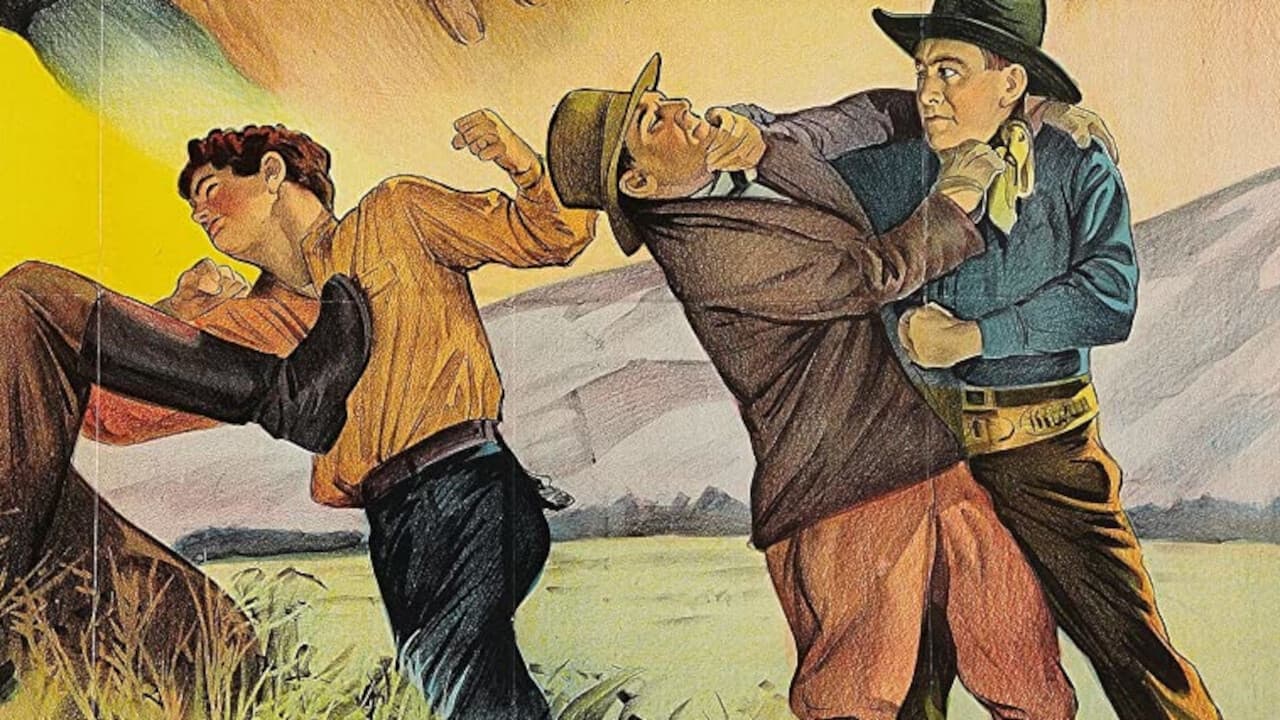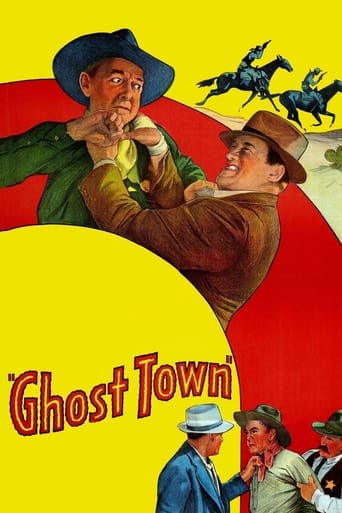Solidrariol
Am I Missing Something?
Salubfoto
It's an amazing and heartbreaking story.
Bergorks
If you like to be scared, if you like to laugh, and if you like to learn a thing or two at the movies, this absolutely cannot be missed.
Celia
A great movie, one of the best of this year. There was a bit of confusion at one point in the plot, but nothing serious.
Michael Morrison
Harry Carey is almost enough to say, but "Ghost Town" has so much more, it's actually hard to know where to start with the praises.Let's try, first, high praise for Earl Dwire (sometimes billed as Earl Dwyre) as Jim McCall, one of the two old desert rats who are partners in a mine and pretty much everything else in the settlement now known as Ghost Town.Usually, Earl Dwire is the strong and silent bad guy, and he seems perfect as such. Here he has lines and a major role, and he carries it off beautifully. It was such a treat to watch him in a bigger part, and to realize he was a very talented actor.My cousin Chuck Morrison (distant cousin, of course) also has a bigger-than-usual part, and even gets screen credit, which he too often didn't in a career spanning the years 1933 to 1944. It is very sad to me to see no information about him, not even here at IMDb. He has a good part here with some great dialogue and shows he should have had a longer and better film career.One of my all-time favorite cowboy heroes, David Sharpe, is second billed and also shows he was a by gosh actor. Funny thing, though, he is generally thought of -- though not by me -- as a stunt man, and his last credit here at IMDb shows him as a stunt driver.One of my biggest regrets is that I blew a chance to meet and talk with him. He was living in the Motion Picture Home and I phoned him and asked for a chance to come visit. He said Sure and when I then said "interview," he said no interview. But I could still come visit.Stupidly, I felt I had blundered and was embarrassed so never went.Dave Sharpe was a lot of fun to watch. He was so athletic and graceful, each movement was like poetry.So "Ghost Town" was populated with just tons and tons of talent, and even the ubiquitous Ed Cassidy (268 credits!) had a bigger-than-usual part and he too showed he could handle bigger roles.Other actors are generally unknown, but even the smallest roles were extremely well handled.And one reason: They had a great script! Clever dialogue moved along the intricate story, and director Harry Fraser, who also wrote both the story and the screenplay, was very detail-oriented.I saw "Ghost Town" in a mediocre print at YouTube, and loved it despite the print. I highly recommend "Ghost Town" with Harry Carey and Dave Sharpe, and think it is about as good a B western as you can find.
classicsoncall
If not for the presence of the venerable Harry Carey, this would be an almost embarrassing title for a picture - there were NO GHOSTS! OK, there was outlaw Blackie (Chuck Morrison) making as if old McCall (Earl Dwire) might have turned into one after being presumed dead, but that's a stretch. I'll go ahead and place this one in my IMDb list of Ghost Themed Westerns, but it's going in almost by default.Now I realize Harry Carey was a major Western film star during the silent era, and his reputation carried over into talkies, but by the time he appeared in this flick he was already fifty eight and appeared maybe a decade older by today's standards. I cringe when I say he was over the hill, but there was a point in the picture when he used both hands to place his foot in the stirrup of his horse Sonny. Take a good look at Carey's face during the jail break scene, in the close-ups he looks like Ray Bolger's scarecrow from "The Wizard of Oz", and that's without any makeup.Still and all, old Cheyenne Harry saves the day for McCall and the Royal Flush Mine when he helps Sheriff Blair (Ed Cassidy) bag the bad guys. You have to hand it to the outlaws though, they weren't making a play for Rankin and McCall's gold mine itself, they were going for a sure thing - the ten grand McCall was bringing back with him to invest in the mine and the town of Blackpool Mill. Cheyenne's always a step ahead though, even when he's thrown in jail for stealing McCall's ten grand. He has the air of confidence of someone who's read the script and knows how it's all going to turn out.
FightingWesterner
A couple of old men with a rich silver mine and $10,000 in cash become the target for gangsters who want to take it all. Harry Carey, an old acquaintance of one of the men, witnesses an attempted murder and prevents the the theft of the money, only to be hauled off to jail in a case of mistaken identity.A late entry in the Cheyenne Harry series, started out by a young John Ford at Universal and finished by poverty-row filmmakers, this is generally lackluster, but made palatable by the presence of Carey.Still, it's not totally bad, though there's too many automobiles. It takes away from the western feel.Harry Carey was so charismatic and delivered such great performances, that it makes just about anything he's in worth watching, despite the fact that by this time he was much older than the typical Saturday matinée star
rsoonsa
Rugged Harry Carey, as Cheyenne Harry Morgan, a man whose cinematic past includes many brushes with the law, is ranging south in this Astor films production, when he comes across an old friend named McCall, played by veteran Western performer Earl Dwire, and when McCall is murdered, Cheyenne Harry is arrested and must clear himself of the crime. An assortment of character actors appear in this well scripted and directed product, each process the work of able Harry Fraser, including a trio of villains: Lee Shumway, Roger Williams and Chuck Morrison, acrobatic stuntman David Sharpe as a young deputy and, as a thug's moll in this contemporary Western, Jane Novak who was Carey's leading lady in a number of silent films. There is much to admire in this low budget "B", including the oft naturalistic dialogue penned by Fraser and generally well delivered by the cast, creative and humoursome cinematography by Robert Cline, and the four-footed skills of wandering Harry's most valuable property, the black-maned white steed Sonny. Carey was featured in 26 silent Cheyenne Harry adventures under the direction of John Ford, and this undertaking is the second to last of the long-running series which had continued after the coming of sound, with the gravelly-voiced actor consistently contributing a solid performance as a black hatted frontiersman who simply can not refuse to assist those in need.

